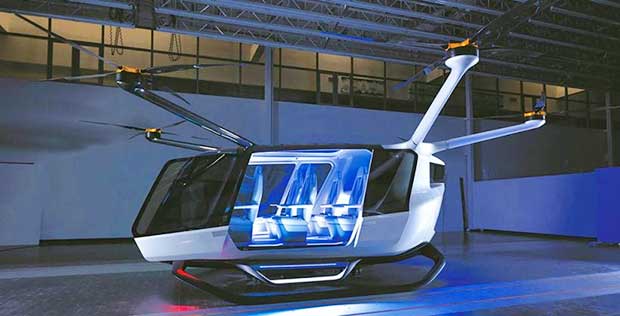
Hydrogen usage in various forms of aviation has become a major focus in recent years. It’s seen as a crucial part of the next phase which can allow us to fly aircraft without the massive fuel expenditure that they come with today. One current discussion revolves around the use of hydrogen fuel cells in VTOL aircraft.
Now, I’ve talked about hydrogen aircraft many times before but this is a new angle on the subject.
Air mobility has come around to the idea of going fully electric, using lithium-ion powered batteries to get their aircraft up in the sky. However, some companies are quietly working on the idea of using VTOL aircraft powered by hydrogen fuel cells. The belief is that the technology is quite simply better than what one would get with lithium-ion batteries. With a greater level of energy density per power cell and also greater lifespan, they are seen as the ideal solution for VTOL aircraft in the future.
One company who is working on such hydrogen fuel cells is HyPoint, who have worked with producing a fuel cell powertrain that is capable of producing a ridiculous 1000W per kilogram of specific power. This comes with a whopping energy density of 530 watt-hours per kilogram. That’s exceptional and is far beyond what even the best lithium-ion battery could hope to be able to achieve – even in the years to come.
The aim for HyPoint is to eventually extend even further, moving to using a 2,000 W/kg power and a 960 Wh/kg energy density. However, this is still in a prototype phase, so we don’t know when – or if – these systems are going to be available immediately or anytime soon. The hope is that the system will be ready for testing in 2 years, and commercially available in 3.
How much would this cost?
At the moment, the talk is that price points would still be pretty high. Estimates are built around the idea of selling the product for around $100-500 per kilowatt if it was mass-produced. That’s quite a lot, but it’s going to give us a good idea of what kind of realistic price fees we can expect for such hardware in the future. If it works, though, the level of sustainability and power that it would offer to the industry as a whole would be simply incredible.
Under the watchful eye of Sergey Shubenkov, the Chief of Research and Development at HyPoint, the future looks very bright for this particular project. While many companies in the VTL industry aren’t focusing too hard on the use of hydrogen fuel cells, HyPoint is and it looks like they could change the market and the entire dynamic, should their exciting new product come to fruition soon.
Citation